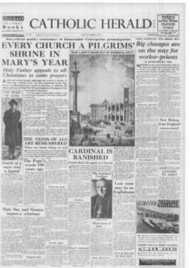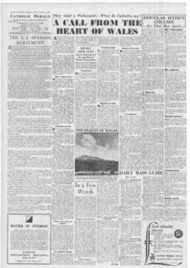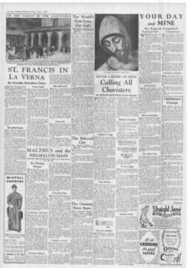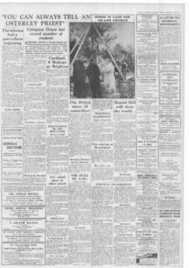Page 4, 2nd October 1953
Page 4
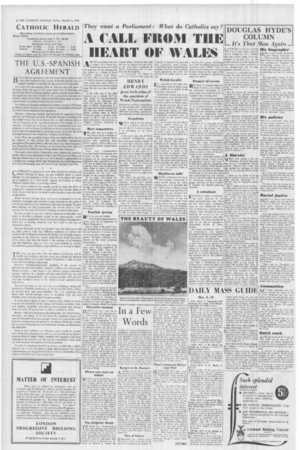
Report an error
Noticed an error on this page?If you've noticed an error in this article please click here to report it.
Tags
Share
Related articles
Bishops Of England And Wales Make History At Autumn...
Conference For Catholic Nurses
New Archbishop Of Cardiff Quotes Welsh Catholic Poet In...
South Wales Notes
An Inspiration To The Welsh
A CALL FROM THE HEART OF WALES
AHUGE procession and rally in support of a Welsh Parliament took place in Cardiff last Saturday. It was preceded the day before by a dinner at which Cardiff's Catholic Lord Mayor was host. Because of the number of Catholics present, arrangements were made some days before to serve an alternative dinner to them since the day was one of abstinence.
At the rally one of the chief speakers was a Catholic M.P. for Mid Ulster (if anti-Partitionists will forgive the solecism), and when we consider that the prophet of Welsh Nationalism is a distinguished Catholic convert and that one may discern several distinctly Catholic ideas in Welsh Nationalist policy, common sense ought to tell us that we cannot ignore this news if we are to be intelligent Catholics interested in events around us.
More supporters THE rally was, as a matter of fact, one in which a number of prominent Welsh Liberals, Welsh Labour folk (including some Welsh Labour M.P.$) and a few independent Welsh Conservatives took part.
There were representatives from the Scottish Nationalists, who remind us that it was among Catholics of the Gaelic-speaking Highlands that opposition to the 1707 Act of Union was most pronounced. And I dare say that even today there is plenty of natural nationalism among the Catholic descendants of the men who fought for the Young Chevalier.
As we might also expect, the Irish Anti-Partition League gave this rally its full support. For some years now there has been an unwrittql understanding among all the s'5-called "Celtic" nationalist movements, including the Breton, to give each other support. And this means that quite a large proportion of support for this rally was given by Catholics. The Bretons, indeed, are among the most devout and loyal Catholics in the world.
English group BUT we may go farther.
Two English groups have recently come out as supporters of Welsh Nationalism.
One of them is the small Common Wealth Party, which just after the war looked as if it were likely to become one of the larger "little forces." Of quite a different cornplexion are the newly re-formed Distributists.
The Distributists in their early days were strong supporters of Irish Home Rule. And their slogan, "Poland is the test," reminds us of their support for the little "green" countries that formed a belt between Prussia and Russia.
On the ground that each nation must have institutions corresponding with the national character, the new nationalist movement finds support from some English Tories, one of whom told the writer that he was in favour of Welsh Nationalism if only that his own people, the English, might have a chance of governing themselves.
There is one school of thought among the Welsh Nationalists that holds that unless a Welshman has been sent to work outside Wales on the principle of "mobility of labour," he should return to Wales forthwith or lose the right to call
himself Welsh. Probably this view will not be popular because many of the most useful supporters of Welsh Nationalism live in London and Birmingham.
"A Parliament for Wales in Five Years" has been the slogan of
HENRY EDWARDS
gives both sides of the question of Welsh Nationalists
Nationalists and their sympathisers for the last few years. Notice that "magic" word five. and compare with Five-Year Plan. and the fiveyear duration of most parliaments.
Suspicion
wHAT should be the attitude of a Catholic towards this state of affairs? Can he just ignore it as something of no consequence?
A few years ago, talk of Welsh or Scottish Nationalism would have appeared harmless chatter. If it is true that Catholics made an exception in the matter of Irish Nationalism, we are well aware why we did so. But many of us would be hard pressed to explain why the cause of the Anti-Partition League leaves us cold. Is it possible that we Catholics who in the past backed European nationalist movements pretty freely have become rather dubious about the nationalist movement today'? If that is so, we might have good reason.
We might, for example, say— and 1 may be putting words into Catholics' mouths—that modern nationalism is everywhere suspect of being Communist-inspired. But if there is any truth in the notion, we shall have to be careful where such opposition may lead us. It is well known that Communists will back all kinds of sound reforms for their own purposes.
Does this mean that Catholics must always oppose such reforms? If it did, the Communists would have an easy job. They would soon be able to point their fingers at Catholics as opposers of even the most reasonable social project. Communists must never succeed in causing a paralysis of the Catholic social conscience, but they will succeed if we adopt such an attitude.
Welsh loyaltx T is quite likely that other con
siderations tend to make many of us indifferent or hostile to the nationalist movement.
Nationalism in these isles at any rate has grown upon the land. That is where it grew in Ireland. That is where it grows in Wales today, even though you,may see in certain mining areas of Wales, e.g., the anthracite valleys of West Glamorgan and East Carmarthen, a sufficiently powerful wave of nationalism to win council seats from Labour.
It is no accident that the Welsh national anthem harps on the word "gwlad," which means very much more than "land" in the territorial sense. It is strictly a fperuincicael. word implying loyalty to a But by the tragic necessities of the last century the mass of Catholics in my country live without knowledge of this "gwlad." They or their near ancestors came hither perforce to settle in the built-up areas of industry. Some have kept a love for their motherland. Some have found a love for Wales. But many have lost the one without gaining the other. And it is no secret that many have lost the Faith. The miracle is that so many have kept it.
'Highbrow talk' wELSH Catholicism even more than English Catholicism is chiefly found among the urban working class. It is inevitable that any "lead" given to them is based upon the supposition that they are untroubled by any national consciousness. I did come upon a very important exception to this last year at a meeting of young Catholic men. But it was an exception.
To the great mass of Catholics in Wales. talk of Welsh matters is so much highbrow talk. I have had the greatest difficulty in persuading a middle-class young Welshman in Cardiff that Welsh peasants still compose classic Welsh verse in pubs and recite them next morning to their fellows in the hope, often realised, of getting an impromptu englyn in return.
Danger of excess IIUT there is a deeper objection
which Catholics may snake to the nationalist movement. it is based upon what might be called a Catholic sense of proportion.
Although it is true that to ignore nationalism in Europe is to ignore much that is Christian and Catholic—is to ignore Europe, in fact— there are nationalistic excesses which to many thoughtful Catholics • are so inseparable from nationalism that for all practical purposes nationalism is itself an exaggeration.
Maritain in an appendix to his Primacy of the Spiritual has warned us of the danger : but it is only fair both to him and nationalists that he ascribes the excesses as due to the false universalism of secular origin.
.Nationalism is in part a reaction from this false universalism, whether it is inspired by humanitarianism or international capitalism, or international Communism which survives in spite of the new Communistic nationalism.
But again, nationalism tends to yet another excess. It has a way of connoting "nation" and "race. It falls then under the condemnation of the Church, which has frequently had to condemn racism. Again, it is only fair to the Welsh Nationalists to say that they have also condemned not only racism but an even more subtle error, that of identifying nation and language. and boast of their number of English and English-speaking members.
A substitute
CATHOLIC critics of nationalism have, however, by no means exhausted their case. They do with some justice sometimes point out that nationalism has a way of becoming a substitute for religion. They can point to many instances of association of nationalist movements and anticlericalism. They are aware that in spite of no end of apologetic, nationalism thrives on xenophobia. '
All things considered, there is an accumulative case against nationalism which is so strong that it hardly needs the present Cornmunist scare as the final straw.
And yet, it would be quite easy to show that the case against it is really a summary of the human abuses of a sound instinct. The objections certainly point to the need for a careful regulation by the spiritual arm of the national consciousness.
What my country needs so much more than a Parliament--or a monarchy or a return to power of the old gentry or a soviet or what you will—is the Faith. I nearly said that it needs another Methodist revival. But you cannot have the sense of politics without the sense of something prior and specific and self-sufficient, which is what we ought to mean by religion.
blog comments powered by Disqus


